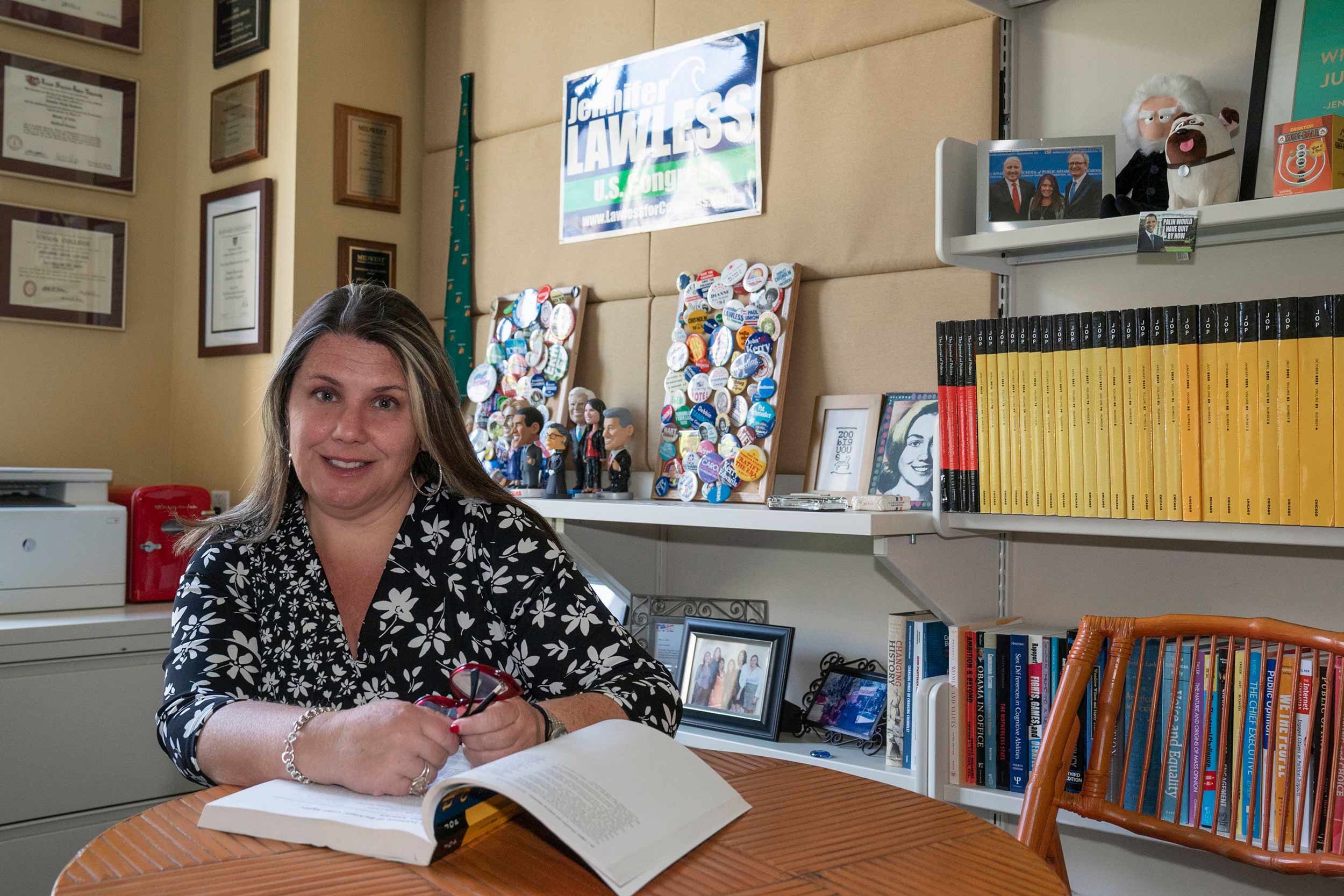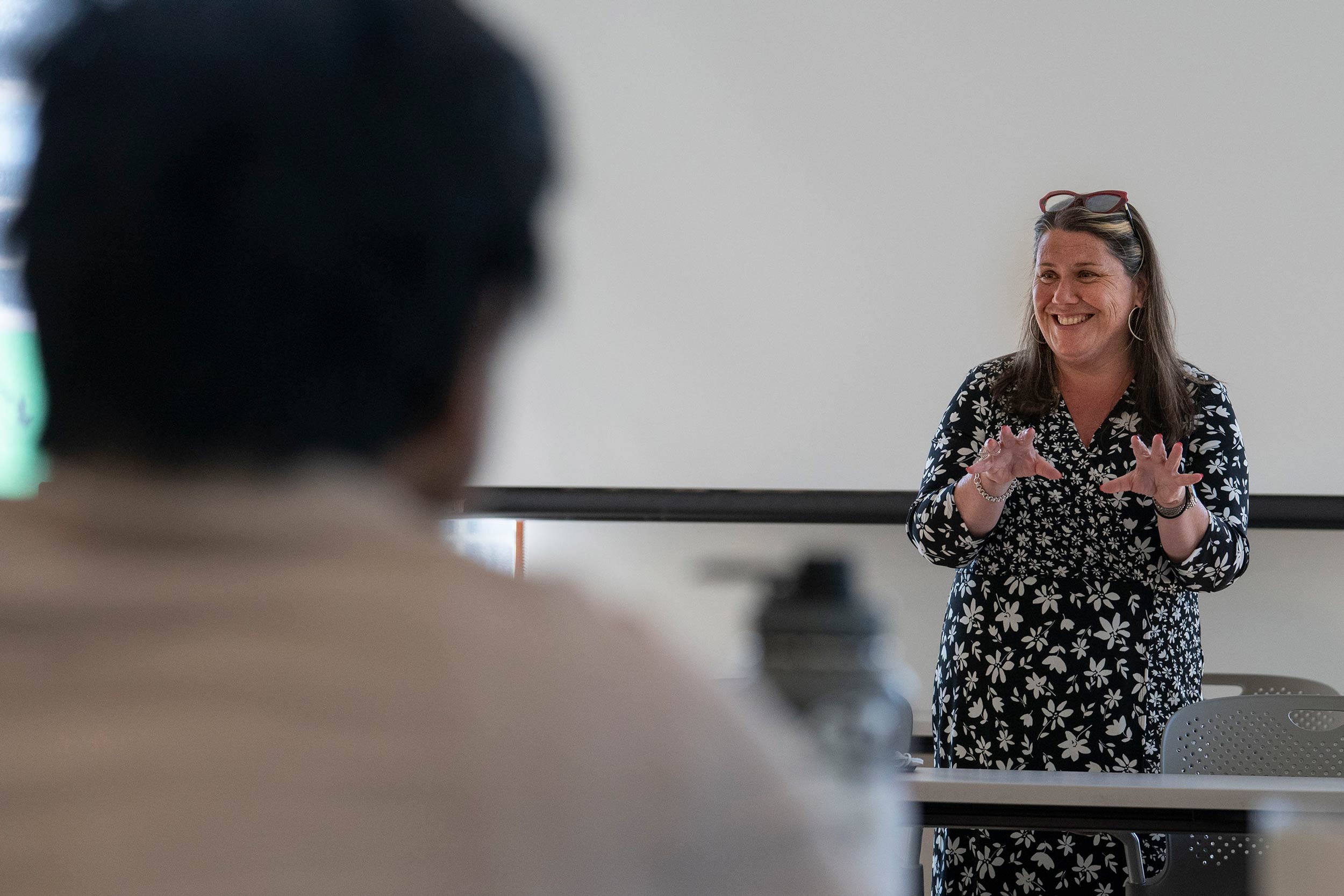Faculty Spotlight: Good People Make Good Politics, Professor Believes

Jennifer Lawless insists there are good, likable people in politics, and there’d be a lot more of them if only more people would get involved.
That may be hard to believe for those who binge-watch news channels and dial up radio talk shows, but the Leone Reaves and George W. Spicer Professor of Politics at the University of Virginia has political street cred as a former candidate for the U.S. House of Representatives and current chair of UVA Department of Politics.
Lawless is also a senior fellow at UVA’s Miller Center of Public Affairs, a public policy professor in UVA’s Batten School of Leadership and Public Policy and the author of eight books, several of which delve into the question of why some potential candidates run for office and why others don’t.
“There are people who are working in politics who are normal, nice people, and people on both sides generally get into this for the right reasons,” she said. “You can totally disagree with their reasons and you can completely think that they’re ruining the country, but they’re not waking up in the morning saying, ‘Oh, I’m running for office because I want to ruin the country.’ They are waking up in the morning to get involved because they feel just as strongly about their views.”
That’s also how she feels about teaching politics at UVA.
“I like to talk about politics. One of the great things is talking to students who are political junkies who live across the country,” Lawless said. “So let’s say they are from Pennsylvania. I’m like, ‘Tell me exactly what’s happening.’ You don’t usually get to talk to people like that, so teaching a campaigns and election class is fun and rewarding, even if it’s just a small group of the students who come up to you afterward.”
Lawless said it’s important that students learn and think about things in different ways, “but I also want them to have fun. ... I want them to look forward to coming, and when you can see they are excited to be there, it’s contagious.”

Lawless does not expect her students to run for office. She does, however, want them to participate in the political process, from door knocking to exit polling. (Photo by Dan Addison, University Communications)
Her students say they find Lawless engaging, funny and supportive.
“The Army gave me three years to complete my graduate coursework and defend my dissertation,” said U.S. Army Maj. Joseph Amoroso, a commissioned field artillery officer who earned doctoral and master’s degrees in political science from UVA.
His research focused on American political behavior and civil-military relations, specifically studying how military experience influences participation in electoral politics. He serves as an instructor of American politics in the Department of Social Sciences at the U.S. Military Academy at West Point.
“From our first meeting, Jen made it clear that she was invested in my success. She helped me translate my seemingly disparate interests into an actionable research agenda,” he recalled. “She had an immediate sense for the type of dissertation I could write and gave me pragmatic advice on how to move forward, as if she’d thought about my specific topic for years.”
Jacob Lollis, a doctoral candidate in the Department of Politics, said Lawless’ work is “rigorous, top-notch social science. She has written foundational work explaining why women are underrepresented in American political institutions.”
Richard Burke, a graduate student in the Department of Politics, said Lawless also has a talent for putting her students at ease.
“When I gave my practice job talk last year before the entire department – a super nerve-wracking event – Jen was the first to ask a question. And before asking the question, she said, ‘This is the best practice job talk I’ve ever attended.’ It really took the pressure off me,” Burke said. “It was very kind of her because it influenced the momentum of the questions and answers.”
Lawless wasn’t born into politics, but she did grow up with it.
“In our household, politics was always something that was talked about,” she said. “Not that my parents would consider themselves political junkies. I don’t think they think of themselves like that. But we always had lawn signs up for the local candidates, I always went with my parents to vote, and there was always this sense that the president makes important decisions.”
Her interest in affairs of state grew deeper as she grew older. She watched the Iran hostage crisis in the late 1970s, the Iran-Contra hearings in the 1980s and the confirmation hearings for U.S. Supreme Court Justice Clarence Thomas in the 1990s.
“I was in 11th grade and I remember rushing home from school to watch the hearings. I remember very vividly Anita Hill being grilled by an all-male Senate Judiciary Committee,” Lawless recalled. “That was the turning point. It was like, ‘Oh my gosh, we need more women in politics.’ We need qualified women in politics and we need to make sure that we’re treating women in society in a fair and equitable way.”
While Lawless was a faculty member at Brown University, an incumbent member of Congress decided that he would not seek a vacated Senate seat.
“He said that he was very comfortable in the seat he was in, and that’s not how any accountable representative should ever talk,” she said. “They should be running scared. They should always be trying to represent their constituents. And he, in particular, had voted 27 times against a woman’s right to choose. That was an issue that was very, very important to me.”
The race was on.

Politics was a part of growing up for Lawless who found fascinating the televised hearings of the 1987 Iran-Contra scandal and the 1991 confirmation hearings for U.S. Supreme Court Justice Clarence Thomas. (Photo by Dan Addison, University Communications)
“It all came together. My politicized upbringing, the fact that I thought women were underrepresented in politics – I had just written my first book about women’s representation and political ambition and then a sitting member of Congress says, ‘Oh, I don’t really want to run for a higher seat because it’s too difficult and time-consuming to campaign,” she said.
“They had me at that point, and so I threw my hat into the ring. And although I lost the race, that remains the best experience I’ve ever had,” she said.
Lawless does not expect her students to run for office. She does, however, want them to participate in the political process, from door knocking to exit polling.
“One of the things that’s really important is making sure that the students are engaged in politics. Even amid COVID, in my Election 2020 class, students had to spend an hour a week doing something that was civic engagement, whether it be knocking on doors for a candidate or making phone calls or sending texts for a candidate or going to online events or webinars, just so that they could engage politically,” she said.
Even as an administrator, Lawless remains engaged. Last November, she spoke to 200 U.S. Army cadets for an Election Day conversation.
“Jen called in virtually and gave her forecast on how the night would unfold,” Amoroso, the Army officer, said. “According to the cadets in attendance, she was by far our most dynamic speaker that evening, applying the appropriate amount of political science insight to help the cadets understand real-world electoral phenomena.”
While much is written about Americans being turned off by politics, Lawless said she believes that even partisan politics has an upside.
“Politics has become a team sport for most people. They’re a ‘D’ or an ‘R.’ The way that the parties are polarized makes it a lot clearer to people who only pay a little bit of attention which side is closer to them on the majority of the positions,” she said.
“If we’re going to be a relatively low-information society, there are worse shortcuts than whether there’s a ‘D’ or an ‘R’ in front of your name. Of course, in an ideal world, we wouldn’t be a low-information society.”









